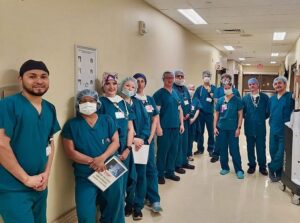The United Kingdom’s healthcare system, known for its comprehensive and high-quality care, is one of the largest employers in the country. Nurses are the backbone of this system, and the demand for qualified nursing professionals is continuously growing. For foreign nurses looking to advance their careers, the UK offers a unique opportunity to work in a world-class healthcare environment with the added benefit of visa sponsorship. This guide will help you navigate the process of securing a nursing job in the UK, including the necessary steps for visa sponsorship, registration, and settling into your new role.
Why Consider Nursing Jobs in the UK?
The UK is currently facing a significant shortage of nurses, creating a high demand for skilled professionals from abroad. This demand translates into competitive salaries, excellent benefits, and ample opportunities for career advancement. Nurses in the UK have access to a wide range of specializations, from pediatric and geriatric care to critical care and mental health, allowing you to tailor your career path according to your interests.
Additionally, the UK’s National Health Service (NHS) and private healthcare providers offer structured career development programs, ensuring that nurses can continually upgrade their skills and qualifications. With visa sponsorship available for eligible nurses, moving to the UK is a viable and attractive option for those seeking to enhance their professional and personal lives.
Understanding Visa Sponsorship
Visa sponsorship is an essential part of working in the UK for foreign nationals. It involves a UK employer sponsoring your application for a work visa, which allows you to live and work in the country legally. For nurses, visa sponsorship often includes additional support, such as assistance with relocation, accommodation, and settling into your new environment.
The main benefit of visa sponsorship is the legal right to work in the UK. For healthcare professionals, this also means access to the UK’s healthcare system, including benefits like paid leave, pensions, and continuous professional development opportunities. To be eligible for visa sponsorship, you must secure a job offer from a UK healthcare provider and meet the specific requirements of the visa category under which you are applying.
Types of Visas for Nurses in the UK
There are several visa options available for nurses looking to work in the UK:
- Skilled Worker Visa
- Health and Care Worker Visa
- Tier 5 Temporary Worker Visa
Each visa has its own set of criteria and benefits, so it’s important to choose the one that best fits your situation and career goals.
Skilled Worker Visa
The Skilled Worker Visa is the primary route for foreign nationals to work in the UK in skilled occupations, including nursing. To qualify for this visa, you must have a confirmed job offer from a UK employer who is a licensed sponsor. The role you are offered must meet the required skill level, and you must also meet the English language requirements.
The application process involves your employer issuing you a Certificate of Sponsorship (CoS), which you will use to apply for your visa. You will need to provide documentation such as proof of your qualifications, English language proficiency, and financial means. The Skilled Worker Visa typically allows you to stay in the UK for up to five years, with the possibility of extending it or applying for permanent residency.
Health and Care Worker Visa
The Health and Care Worker Visa is a specific category under the Skilled Worker Visa, designed to attract healthcare professionals to the UK, including nurses. This visa offers several benefits over the standard Skilled Worker Visa, such as reduced visa fees, exemption from the Immigration Health Surcharge, and faster processing times.
To be eligible, you must have a job offer from an approved UK health or social care employer, such as the NHS or a registered care provider. The job must be in an eligible health or care role, and you must meet the English language requirements. The application process is similar to that of the Skilled Worker Visa, but with the added advantage of streamlined procedures and lower costs.
Tier 5 Temporary Worker Visa
The Tier 5 Temporary Worker Visa is another option for nurses, particularly those looking for short-term work in the UK. This visa allows you to work in the UK for up to 12 months, with the possibility of extension in some cases. It is suitable for temporary roles, such as those in exchange programs or specific short-term projects.
To apply for a Tier 5 Visa, you must have a job offer from a licensed UK employer and a Certificate of Sponsorship. This visa is ideal for nurses who want to gain experience in the UK healthcare system without committing to a long-term move.
Nursing Registration with the Nursing and Midwifery Council (NMC)
Before you can work as a nurse in the UK, you must be registered with the Nursing and Midwifery Council (NMC). The NMC is the regulatory body that ensures nurses and midwives meet the required standards of practice and education.
For overseas nurses, the registration process involves several steps. First, you must demonstrate your qualifications and experience meet the NMC’s standards. This typically requires you to have a nursing degree and at least one year of post-graduate clinical experience. You must also prove your proficiency in English, usually through tests such as the IELTS or OET.
Once your initial application is approved, you will need to pass the Objective Structured Clinical Examination (OSCE), a practical test that assesses your clinical skills. After successfully completing the OSCE and meeting all other requirements, you will be registered with the NMC and can legally work as a nurse in the UK.
Finding Nursing Jobs in the UK
The next step is finding a nursing job in the UK. Many hospitals and healthcare providers actively recruit international nurses, and there are several job portals and recruitment agencies that specialize in healthcare jobs.
Popular job search websites like NHS Jobs, HealthJobsUK, and NursingTimes Jobs list a wide range of nursing vacancies. Recruitment agencies can also be a valuable resource, helping you navigate the job market and connect with employers who are willing to sponsor your visa.
Networking is another effective strategy. Joining professional associations, attending healthcare conferences, and connecting with other nurses on platforms like LinkedIn can open doors to job opportunities.
Preparing Your CV and Application for UK Employers
When applying for nursing jobs in the UK, it’s important to have a well-prepared CV that meets UK standards. Your CV should be clear, concise, and tailored to the job you’re applying for. Include your nursing qualifications, clinical experience, and any relevant certifications or training.
A cover letter is also essential. It should explain your interest in the role, highlight your relevant experience, and demonstrate why you are a good fit for the position. Be sure to tailor each cover letter to the specific job and employer.
Navigating the Job Interview Process
If you are invited to an interview, preparation is key. Interviews for nursing positions in the UK often include both technical and behavioral questions. You may be asked to discuss your clinical skills, your approach to patient care, and how you handle challenging situations.
It’s also important to be familiar with the UK healthcare system, particularly if you are interviewing for a role within the NHS. Demonstrating your understanding of NHS values, patient care standards, and the role of nurses in the UK can give you an edge in the interview process.
Top UK Locations for Nursing Careers
The UK offers diverse opportunities for nurses across the country, but certain cities stand out as top destinations for nursing careers:
- London: The capital city, home to some of the UK’s largest and most prestigious hospitals and healthcare institutions.
- Manchester: A major healthcare hub with a growing demand for nursing professionals.
- Birmingham: Known for its large healthcare sector and numerous job opportunities.
- Edinburgh: Offers a mix of public and private healthcare roles in a vibrant cultural setting.
- Bristol: A dynamic city with a strong healthcare system and a high quality of life.
Each of these cities offers unique benefits and challenges, so it’s important to consider your personal preferences and career goals when choosing where to work.
Work Environment and Expectations in UK Healthcare
Working as a nurse in the UK involves a variety of responsibilities, depending on your role and specialization. Nurses in the UK typically work in multidisciplinary teams, collaborating with doctors, therapists, and other healthcare professionals to provide comprehensive patient care.
The work environment can be fast-paced and demanding, particularly in busy hospitals and clinics. Nurses often work in shifts, including nights, weekends, and holidays. However, the UK healthcare system places a strong emphasis on work-life balance, and most employers offer flexible working arrangements and support for continuing professional development (CPD).
Living in the UK as a Nurse
Living in the UK as a nurse offers a high quality of life, with access to excellent public services, including healthcare and education. The cost of living can vary significantly depending on the city, with London being more expensive than other parts of the country. However, nursing salaries are generally competitive, and many employers offer additional benefits such as housing allowances, pension schemes, and paid leave.
The UK is known for its rich history, diverse culture, and beautiful landscapes, providing plenty of opportunities for leisure and exploration. As a nurse in the UK, you’ll have the chance to build a rewarding career while enjoying a vibrant and dynamic lifestyle.
Challenges Faced by Foreign Nurses in the UK
While the UK offers many opportunities, foreign nurses may face certain challenges when moving to a new country. Adapting to the UK healthcare system and practices can take time, particularly if you are used to different medical protocols or patient care standards.
Language barriers can also be a challenge, especially if English is not your first language. However, many employers offer language support and training to help you improve your communication skills. Building a professional network from scratch can be daunting, but engaging with colleagues, joining professional associations, and attending industry events can help you establish connections and advance your career.
Conclusion
In conclusion, nursing jobs in the UK offer a wealth of opportunities for foreign professionals, with the added benefit of visa sponsorship. Whether you choose the Skilled Worker Visa, Health and Care Worker Visa, or Tier 5 Temporary Worker Visa, the UK provides a supportive environment for nurses to develop their careers. With competitive salaries, excellent benefits, and the chance to work in a world-class healthcare system, the UK is an ideal destination for nurses looking to make a meaningful impact on patients’ lives while enjoying a fulfilling personal and professional experience.
FAQs
-
What is the average salary for nurses in the UK?
- The average salary for nurses in the UK ranges from £25,000 to £40,000 per year, depending on experience, specialization, and location.
-
How long does the visa sponsorship process take for nurses?
- The visa sponsorship process can take anywhere from a few weeks to several months, depending on the visa type and your specific circumstances.
-
Do I need to speak English fluently to work as a nurse in the UK?
- Yes, you must demonstrate proficiency in English, typically through tests like the IELTS or OET, as it is essential for effective communication in a healthcare setting.
-
Can I bring my family with me under the Health and Care Worker Visa?
- Yes, the Health and Care Worker Visa allows you to bring your dependents (spouse/partner and children) to the UK, provided they meet the eligibility criteria.
-
What are the prospects for career advancement in the UK nursing sector?
- The UK offers numerous opportunities for career advancement in nursing, including specializations, leadership roles, and further education opportunities such as pursuing a master’s degree or advanced certifications.




